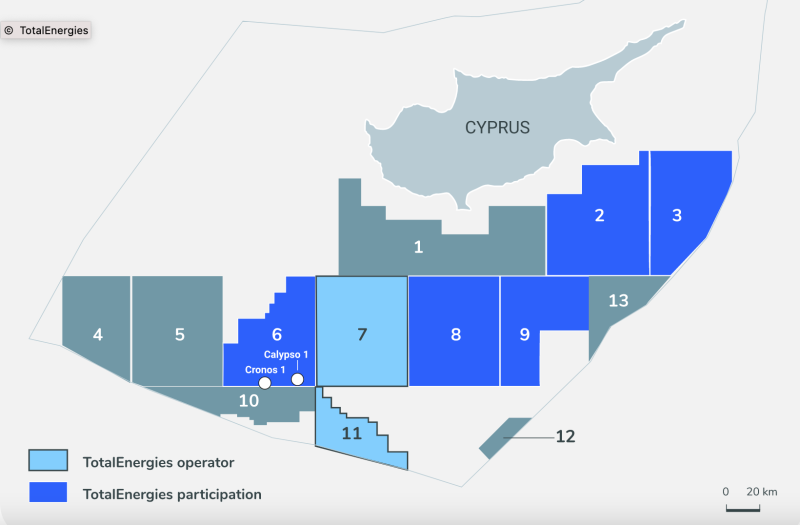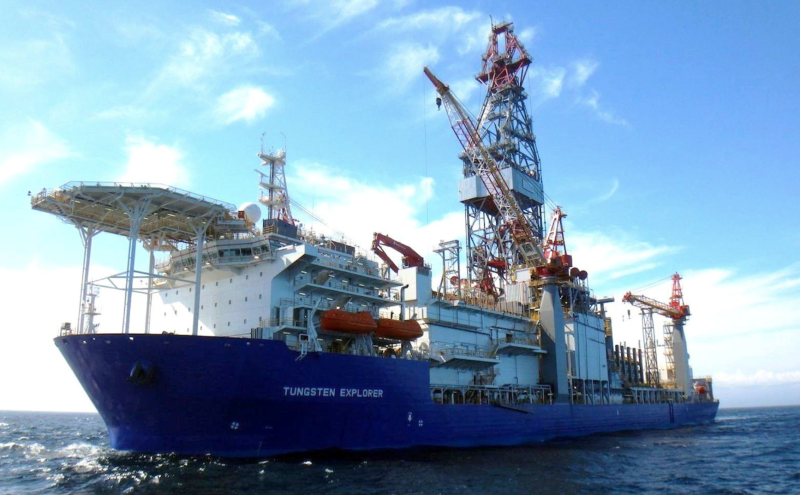Partners Eni and TotalEnergies have confirmed a major gas discovery in the Cronos-1 wildcat exploration well in Cyprus’ deepwater Block 6, 160 km off the island’s coast in the Eastern Mediterranean.
Preliminary estimates suggest the presence of nearly 2.5 Tcf of gas (70 Bcm) in place with significant additional upside to be evaluated with a new exploration well (Zeus-1) to be drilled next on Block 6, according to separate news releases issued by the companies.
Vantage Drilling’s Tungsten Explorer conducted drilling operations at Cronos-1. The well encountered several good-quality carbonate reservoir intervals and confirmed earlier data acquisition campaigns that had suggested an overall net gas pay of more than 260 m with excellent permeability.
Cronos-1 is the fourth exploration well drilled by Eni Cyprus and its second well in Block 6. Eni, together with TotalEnergies, drilled its first well in Block 6, Calypso-1, which was hailed as a success in February 2018 after it encountered an extended gas column of rocks of Miocene and Cretaceous age, with the Cretaceous sequence possessing excellent reservoir characteristics.
Egypt Has Its Zohr; Cyprus Has Son of Zohr
Calypso-1 is significant because it confirms the extension of the Zohr field’s carbonate play into Cyprus’ exclusive economic zone, Eni reported at the time, referencing the massive Zohr gas field found in Egypt’s Shorouk block in 2015—the largest gas find to date in the Mediterranean.
Eni and state-owned Egyptian General Petroleum Corporation operate Zohr through a 50/50 joint venture; participating partners include BP, the UAE’s Mubadala Petroleum, Russia’s Rosneft, and Egyptian Natural Gas Holding.
The results from Cronos-1 further confirm that the petroleum-rich characteristics of Zohr’s geology extend along the seabed into Cypriot waters.
Eni holds 50% as operator of Block 6 with TotalEnergies holding a 50% participating interest.
Eni also operates Blocks 2, 3, 8, and 9 and has participating interests in Blocks 7 and 11 operated by TotalEnergies. In turn, TotalEnergies has participating interests in all blocks operated by Eni.

Following the Cronos-1 announcement, media quickly tied the significance of the discovery to Eni’s efforts to help Europe diversify its gas supplies; and indeed, the Italian and French partners are assessing fast-track development options on the engineering side that might lend credibility to such speculation.
But as Charles Ellinas, a senior fellow at the Global Energy Centre of the Atlantic Council, argued in an editorial published in the Cyprus Mail on 28 August, a bigger picture is unfolding in the East Med considering that Europe—though panicked at the near term—has made it clear to potential suppliers that its appetite for natural gas will wane by 2030.
He cites as an example a recent memorandum of understanding signed between the EU, Egypt, and Israel that restricts gas purchases to 2030 with no provision to extend the term.
“I believe this position (regarding 2030) will be challenged in a few years when it is realized that renewables and hydrogen alone cannot provide Europe’s energy needs reliably,” Ellinas wrote. “But right now, this is the official EU policy, and it discourages oil companies and institutional investors from investing in long-term projects that depend on supplying the EU with gas.”
The recent Cronos-1 discovery raises Cyprus’ estimated gas reserves to around 13 Tcf (in areas not under dispute with Turkey) and the discovery confirms that Blocks 5, 6, 7, 10, and 11 are prolific in gas, he continued. By expanding Egypt’s LNG plants or building an LNG plant in Cyprus itself, East Med gas could flow to Asia via the Suez Canal, a scenario suitable to the long-term thinking that goes into assessing the financial viability of multibillion dollar megaprojects.
Chevron Gets Serious About Aphrodite
In July, Cyprus’s Energy Minister, Natasa Pilides, announced that Chevron had agreed to drill a new well in Q1 2023 on the Aphrodite gas field which the US major discovered in 2011. Aphrodite, with its estimated 4 Tcf of natural gas reserves, was the first major gas discovery offshore Cyprus.
The government’s announcement followed a meeting with Clay Neff, president of Chevron Middle East, Africa, South America Exploration and Production in Nicosia, Cyprus, on 21 July at which the company told the government it would finalize a development concept for Aphrodite by yearend—a concept likely to synergize with existing infrastructure to add Aphrodite gas to Israeli throughput bound for Egyptian LNG plants.
Aphrodite lies along the Cyprus-Israeli border opposite Israel’s Leviathan gas and condensate field where Chevron is drilling new production wells to boost gas shipments to Egypt for conversion into LNG.
ExxonMobil Mulls Development of Glaucus
In March of this year, ExxonMobil completed its Glaucus-2 appraisal well which had been announced by the Cypriot Ministry of Energy, Trade, and Industry in late 2022, but results have yet to be reported.
ExxonMobil made what it claimed in February 2019 to be the world’s third-largest natural gas discovery in 2 years off the coast of Cyprus in the eastern Mediterranean Sea and, based on preliminary interpretation of the well data, reported that the discovery could represent up to 8 Tcf of in-place natural gas resources.
ExxonMobil Exploration & Production Cyprus (Offshore) Ltd. operates Block 10 with a 60% interest in partnership with Qatar Petroleum International Upstream (40%).



